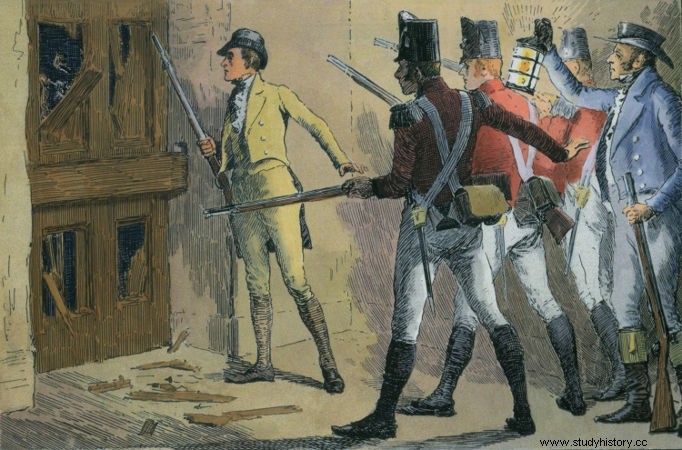
The luddism it was a movement of workers who banded together and revolted against machines at the beginning of the Industrial Revolution. The organized action of the Luddites consisted of invading a textile industry and promoting the destruction of the machines that produced the goods. This movement began in Nottingham and spread throughout England between 1811 and 1816.
Context
Ludism and other workers' movements, such as Chartism, emerged as a direct consequence of the transformations caused in labor relations and in the quality of life of English workers after the Industrial Revolution. Workers organized themselves against the precariousness that industrialization brought to their work.
The Industrial Revolution basically consisted of a period of great technological advance that allowed the birth and development of modern industry. This first phase of the Industrial Revolution took place from 1780 onwards, according to Eric Hobsbawm|1| (Other historians claim that this process began in 1760).
The great invention of this period was the improvement of the steam engine , by James Watt, who initially benefited the textile industry (which produces clothing). This invention allowed, for example, the accelerated installation of railways throughout England. The introduction of these machines in the textile industry caused an increase in production, a reduction in wages and, consequently, an increase in the profits of the bosses.
The Industrial Revolution first started in England and then spread across Europe and other parts of the world. The reasons that explain the English pioneering spirit are:
1. Laws of Enclosure: since the 16th century, England had extended the expulsion of peasants from the Common Lands so that the bourgeoisie and the Gentry (English country nobility) to establish pastures in these places. The expulsion of peasants from their land made it possible to increase the availability of labor and expand cotton production.
2. Capital accumulation: the mercantilist practices put in place by England, mainly from the Navigation Acts of 1651, allowed the English bourgeoisie to accumulate the necessary capital to invest in the development of machinery.
3. Coal and iron reserves: England had, in the 18th century, large reserves of coal and iron that were vital for the progress of modern industry.
The combination of these factors enabled industrial development in England and, once the industry began, great transformations took place. The first major change that the Industrial Revolution brought was the devaluation of the worker , as the machines replaced skilled craftsmen and were manned by anyone. This caused the worker's salary to decrease.
The wage reduction was compounded by employers' preference for hiring women and children, as they were less prone to riots and were paid even less than an adult man. In addition to the drop in wages, the worker was subjected to an exhausting workload and it was common for workers to be forced to work for 16 hours a day . These degrading conditions for workers increased profits and enriched the bosses.
Workers' organizations and playfulness
The deplorable working conditions and intense exploitation caused workers to organize and express their dissatisfaction. One of the first examples of workers' organization against the precariousness caused by the industrialization of work became known as ludismo.
The term luddism comes from luddite, from English, and mentions Ned Ludd , supposed English worker who had been the pioneer in the destruction of machines as a way of expressing his dissatisfaction. The Luddites were also known as "machine breakers", because they acted by promoting the destruction of industrial machines.
As we say, during this period, the English worker saw his salary drop considerably. In the city of Bolton, for example, a weaver was paid about 33 shillings in 1795, and by 1815 the same weaver was paid 14 shillings|2| . This wage decrease, however, was not accompanied by a reduction in the workload and a drop in the cost of living, that is, the worker had been proletarianized and his life precarious.
This wage decrease, coupled with the fact that a machine replaced the manual labor of many men, led to the emergence of the Luddites. Thus, Luddism was a movement of workers who fought against the mechanization of work. The Luddites understood that the machines, in addition to stealing the jobs of human beings, contributed to the reduction of the worker's salary and, thus, it was something that had to be destroyed.
An important observation is that Luddites cannot be seen as technophobic. The action of the Luddites was exclusively a reaction against the precariousness that industrialization generated in their lives, and this action was strategic and aimed at putting pressure on the bosses. This movement began in Nottingham in 1811 and existed throughout England in 1816. Luddite movements were also recorded in other parts of Europe, such as Belgium.
The action of the Luddites consisted of the following:attacks were organized against factories at night, where a crowd of workers invaded the established place and destroyed all the machines they could. The Argentine historian Osvaldo Coggiola also recorded that factory owners received threats from workers to promote the dismantling of their machines|3| .
The action of the Luddites generated immediate repression, both from the factory owners and from the English government. The English government mobilized a large number of soldiers (12,000) to repress the Luddites|4| , and an 1812 law (Frame-Breaking Act ) turned the intentional destruction of machines into a capital crime and therefore punishable by death. The repression of the English government weakened the movement after 1816.
|1| HOBSBAWM, Eric. The Age of Revolutions, 1789-1848. Rio de Janeiro:Peace and Earth, 2014, p.59.
|2| Ditto, p. 79.
|3| COGGIOLA, Osvaldo. The beginnings of workers' organizations. To access, click here.
|4| You've Got Luddites All Wrong. To access, click here.
By Daniel Neves
Graduate in History
